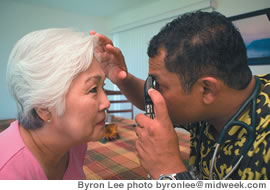
Bringing Back House Calls
November 14, 2007
By


Dr. Frank Williams
The House Call M.D.
Interviewed by Melissa Moniz
What is your area of specialty?
I am a specialist in internal medicine. One of my primary fields of emphasis is in the area of in-home medicine, or house calls. I also perform intensive case investigations for patients with difficult-to-solve medical problems. I have a medical office downtown emphasizing prevention and anti-aging medicine. I also have a medical clinic for uninsured individuals.
How much of your practice is house calls, how much is office work and how much is at the hospital?
Sometimes a whole week can be house calls. The relative number of patients varies considerably between house calls, office and hospital. Many times patients who are hospitalized become home-bound and require in-home medical care. It is always changing and dynamic.
What are some of the more common ailments you treat when you do house calls?
Everything from the common cold to more in-depth problems, such as hypertension, diabetes and heart diseases. Sometimes patients and their families just need to “talk story” about what is going on in their lives, especially with regard to their loved one’s medical problems.
Why do patients opt for house calls over an office visit?
Well, a number of patients are homebound, so traveling to a doctor’s office is extremely difficult, if not next to impossible for families. The most common reason is that people long for the old-fashioned doctor who can sit down and listen to their problems. The most common complaint I hear from patients is that they feel rushed when they visit the doctor, and that they never have a chance to ask questions or clearly state their problems. Statistics have shown that the average doctor’s office visit is about seven minutes. That is a problem for most patients, especially new patients with multiple medical problems. House calls are a different type of encounter that restore the physician-patient relationship. You are treated more like a friend. People are much more comfortable in their own environment, and they don’t have to wait in the doctor’s office. The house call allows patients and families to freely communicate their problems and concerns without feeling rushed.

|
Why do you think there’s been a decrease in house calls?
Well, there are a number of reasons, the primary reason being economic. As you may have read, a large number of physicians are leaving this state or quitting medicine for economic reasons, including declining reimbursements and rising malpractice insurance premiums. Physicians are under tremendous pressure to see more patients in less time. These pressures are only going to get worse. I have read that Medicare plans to cut physician reimbursement by 10 percent as of Jan. 1, 2008, with a proposed decrease of 40 percent by 2010. So, even if a physician desires to perform house calls, the economics limits them. The average physician simply can’t afford to spend the amount of time a house call takes with each patient.
Are there any restrictions due to equipment available when doing house calls?
No. I have everything from EKG machines to instruments to measure oxygen levels in the blood. I also have mobile computing and the Internet. Patients who require further diagnostic testing or a level of care greater than I can provide are referred to the appropriate facility.
What is the age range of most of your patients?
Most of my patients range in age from 50 to 100.
What conditions do you commonly see in the elderly that you feel can be prevented?
Heart disease, strokes, cancers and diabetes. These diseases may in a large part be preventable. It is important that people of all ages become educated in order to prevent these chronic degenerative, and oftentimes life-threatening diseases. For example, trans fats in our foods are very dangerous. These fats are associated with an estimated 70,000-200,000 preventable coronary deaths per year, yet they are still being added to our food and used in restaurants in Hawaii.
How long have you been practicing in Hawaii?
I’ve been practicing in Hawaii since 1991. And I’ve been a physician for almost a quarter of a century.
On the average, how much time do you spend with a patient on a house call?
About an hour.
Can you describe what a typical day of work for you is like?
I try to start my day with a work-out, usually running on the beach and 200 sit-ups and 50 push-ups. Then I make house calls, followed by visiting patients in my office. I then go to the hospital. I usually come home, have dinner and put the kids to bed. Then I may have to go back to the hospital to complete medical records or to do research for certain cases. My days are pretty busy.
Is it ever difficult or distracting having the family around when meeting with a patient at their home, as opposed to when working one-on-one with a patient in an office setting?
Not at all. Families are an asset, especially if they are the primary caregivers. They provide valuable insight into the medical and psychocial problems that affect their loved ones. Keiki are usually fascinated by seeing the doctor in their home taking care of their parents or grandparents.